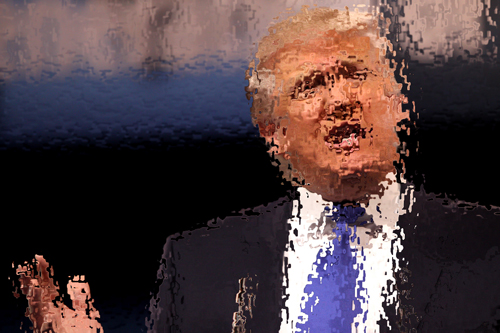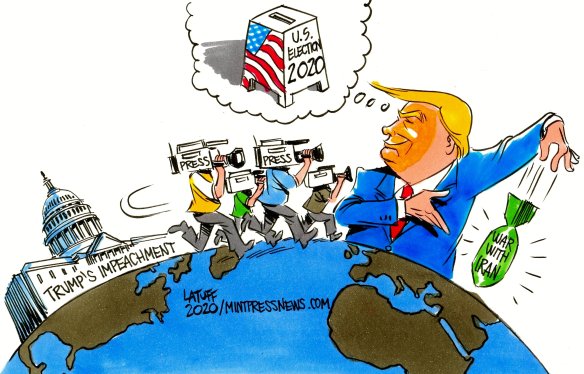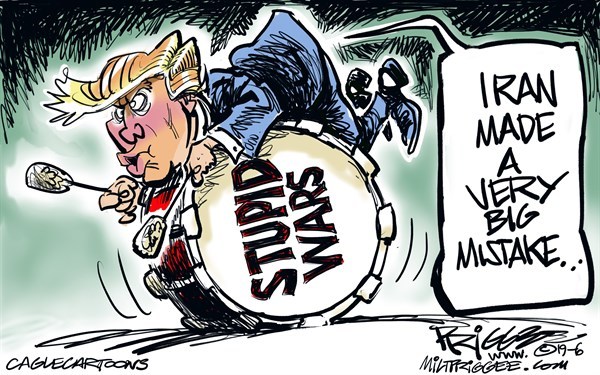The administration’s position(s) on Iraq and Iran are unraveling at a furious pace, while Trump is claiming absolute war powers. And this afternoon the Pentagon appears to have separated itself from the President regarding a possible withdrawal from Iraq.
Here’s the latest. New reporting has revealed deep internal skepticism over the intelligence underpinning the assassination’s stated rationale. Iran just announced it will no longer abide by restrictions in the Iran nuclear agreement, revealing the profound folly of Trump’s withdrawal from the deal, given that Iran had previously been complying with it.
Meanwhile, Trump is firing off deranged, Dr. Strangelovian tweets threatening to strike Iranian cultural targets — a war crime — while blithely asserting zero obligation to inform Congress of any future attacks.
On Trump’s unhinged threat of war crimes, Schiff offered an interesting but overlooked point. He noted there is no chance Trump’s threats to bomb Iranian cultural sites, or his related threat of “disproportionate” military responses to future Iranian attacks, reflect any actual planning in the Pentagon.
“None of that could come out of the Pentagon,” Schiff told me. “Absolutely no way.”
That Trump is threatening to deploy our military to commit war crimes in a manner entirely severed from real-world military planning is deeply abnormal and must not be allowed to slide by as just Trump being Trump.
Adam Schiff wants to hold open hearings on the Iraq-Iran situation asap, which sounds sensible to me.
Speaking of unhinged tweets, see Aaron Rupar at Vox:
Tweeting three days after US forces killed Maj. Gen. Qassem Soleimani, the head of Iran’s paramilitary forces, in an airstrike in Iraq at his direction, Trump indicated that he plans to escalate hostilities with Iran should the country retaliate. He also thumbed his nose at the idea that federal lawmakers represent any check on his powers as commander-in-chief.
“These Media Posts will serve as notification to the United States Congress that should Iran strike any U.S. person or target, the United States will quickly & fully strike back, & perhaps in a disproportionate manner,” Trump wrote. “Such legal notice is not required, but is given nevertheless!”
The House Foreign Affairs Committee (Eliot L. Engel, chair) responded:
This Media Post will serve as a reminder that war powers reside in the Congress under the United States Constitution. And that you should read the War Powers Act. And that you’re not a dictator. https://t.co/VTroMegWv0
— House Foreign Affairs Committee (@HouseForeign) January 5, 2020
Steve Benen writes that there is less and less reason to believe there was any “imminent” threat that required targeting Soleimani. And the New York Times reported:
National security experts and even other officials at the Pentagon said they were unaware of anything drastically new about Iranian behavior in recent weeks; General Suleimani has been accused of prodding Shiite militias into attacking Americans for more than a decade.
It is basically impossible to think that President Trump’s decision to authorize the dramatic assassination of Qasem Soleimani wasn’t influenced by his looming impeachment trial. But we’re also getting more detail now on the precise chain of events leading up to it. I recommend first this Twitter thread from the Times Rukmini Callimachi. The upshot is that the claim of disrupted future attacks was thin at best, inferences drawn from Soleimani’s travel itinerary placed in the context of the shadowy game of tit for tat the two countries have been playing for the last year.
From a different perspective, this is the kind of assemblage of evidence that gets made after you make a decision — justification rather than actual reason. Callimachi has more details. But there’s nothing about the version of the evidence she presents that would make anyone think there was evidence of a threat that required imminent action. Assuming her outlines of the evidence is correct, this is after the fact justification meant to put the operation on a better legal and political footing.
When the Iraqi parliament voted to ask U.S. troops to leave their country, Trump went ballistic.
President Donald Trump threatened to impose deep sanctions on Iraq if it moves to expel U.S. troops and said Sunday he would not withdraw entirely unless the military is compensated for the “extraordinarily expensive air base” there.
Trump’s remarks came on the same day that Iraq’s Parliament voted to support expelling the U.S. military from its country over mounting anger about a drone strike the president ordered last week that killed Iran’s Qasem Soleimani and earlier U.S. airstrikes in the country. The vote was nonbinding.
“We’ve spent a lot of money in Iraq,” Trump told reporters aboard Air Force One as he returned to Washington after spending the holidays at his Florida resort, Mar-a-Lago. “We have a very extraordinarily expensive air base that’s there. It cost billions of dollars to build. … We’re not leaving unless they pay us back for it.”
But the U.S. military is saying something else entirely. This just happened:
The U.S. military says it will reposition troops within Iraq in preparation for a possible withdrawal.
In a draft letter released Monday, Marine Corps Brig. Gen. William H. Seely III says that U.S. forces will be relocated “to prepare for onward movement” and says that “we respect your sovereign decision to order our departure.” A U.S. military official confirmed the letter’s authenticity.
David Atkins provides more insight into how stupid and counterproductive it was to assasinate Suleimani. Along with the withdrawal of Iran from the nuclear agreement and the vote in Iraq to expel U.S. troops, here are two more consequences:
The Iranian people are now rallying to their government in massive numbers to mourn Soleimani just a month after engaging in widespread anti-government protest. A longstanding objective of American foreign policy on both the right and the left has been to weaken Iran’s theocratic government and promote liberal democratic values within the country. There can be no question that killing Soleimani has been counterproductive to that goal. This should come as no surprise at all: not only is it a matter of wounded national pride, Soleimani for all his many evils was seen as a key figure in the battle against hated Sunni extremist powers, especially ISIS, in Shi’ite Iran.
Duh. Also, too:
The U.S. led coalition has suspended its battle against ISIS. The rise of ISIS has been one of the most alarming developments of the last decade, and the fight to contain and eliminate it has been difficult. ISIS rose as a result of a tragically ignored power vacuum among conservative Sunnis in Iraq and Syria resulting from the misbegotten American invasion. All other concerns in the Middle East pale in comparison to taming the threat from ISIS and its attempt to foster a globally self-organized agenda of violent illiberalism. Iran has been a key opponent of ISIS, and fostering closer diplomacy with Iran and Shi’ites in the region has been crucial in the battle against the so-called Islamic State. The Trump’s administration’s betrayal of anti-ISIS Kurdish fighters also doesn’t help. Now with U.S. forces unwelcome and potentially under attack across the region, ISIS will be much freer to being re-organizing and recruiting. Needless to say, this is dangerous not only to those in the region, but to everyone around the world.
Nancy Pelosi announced the House will vote this week on a resolution to limit Trump’s ability to make military decisions without Congress.
The move to curtail President Donald Trump’s ability to act unliterally is designed to force Republicans in the Senate to address the heightened tension with the Middle Eastern nation.
“Last week, the Trump Administration conducted a provocative and disproportionate military airstrike targeting high-level Iranian military officials,” Pelosi wrote in a letter announcing the legislation to her colleagues Sunday night. “This action endangered our service members, diplomats and others by risking a serious escalation of tensions with Iran… we are concerned that the Administration took this action without the consultation of Congress and without respect for Congress’s war powers granted to it by the Constitution.”
The legislation, which is privileged, forces the GOP-led Senate to vote on the matter, teeing up a political battle over whether to reign in a president’s ability to circumvent the Legislative Branch when conducting foreign military action. It comes amid intensified tensions with Iran after the weekend’s U.S. airstrike in Iraq that killed one of Iran’s top military generals, Qassem Soleimani.
In other news, John Bolton has finally stopped being coy about testifying. He says that if he’s subpoenaed, he’ll testify at the Senate trial. Greg Sargent:
For one thing, as The Post’s Jennifer Rubin points out, this means House Speaker Nancy Pelosi (D-Calif.) has just been given new leverage to keep insisting that Senate Majority Leader Mitch McConnell (R-Ky.) agree to a real trial, including witnesses such as Bolton, while she delays in sending over the articles of impeachment.
I would add that this also badly undercuts one of the GOP’s dumbest talking points: That the only reason House Democrats haven’t sent over the articles is because their case is weak. By saying he’s willing to testify, Bolton has suddenly made the choice that Senate Republicans must face into something that’s very real: Either they accept Bolton’s offer, or they decline it.
Heh.




